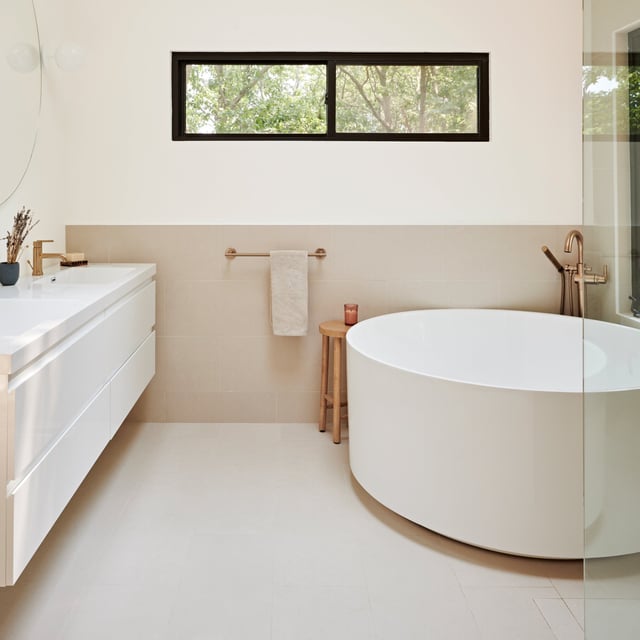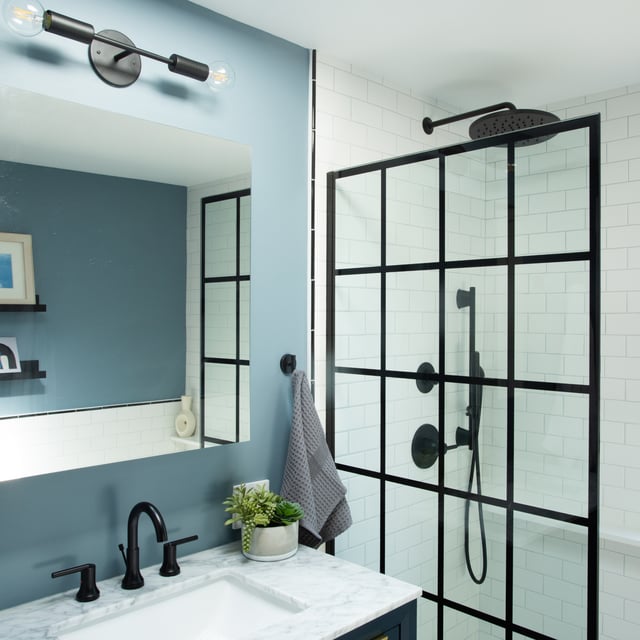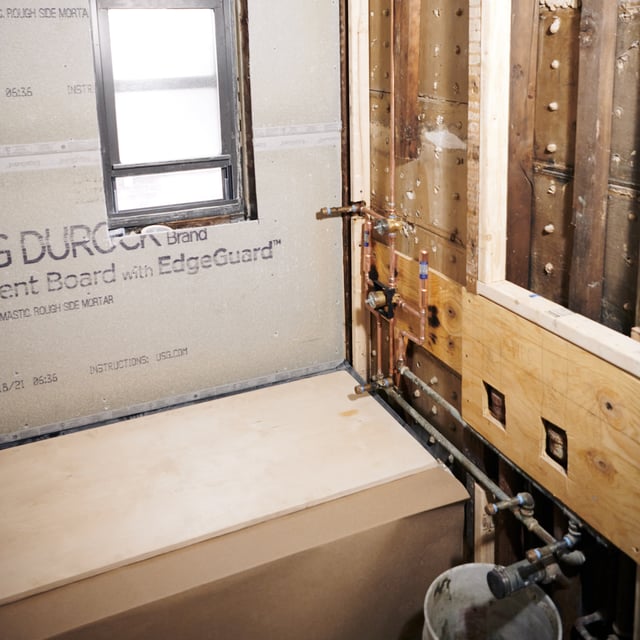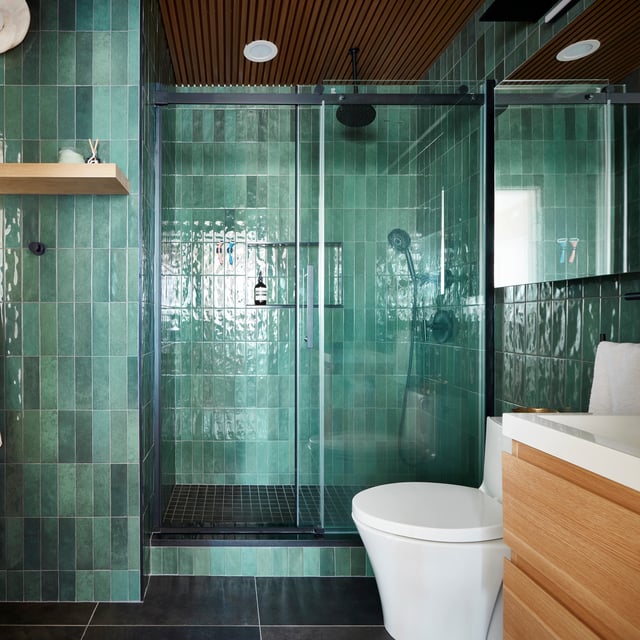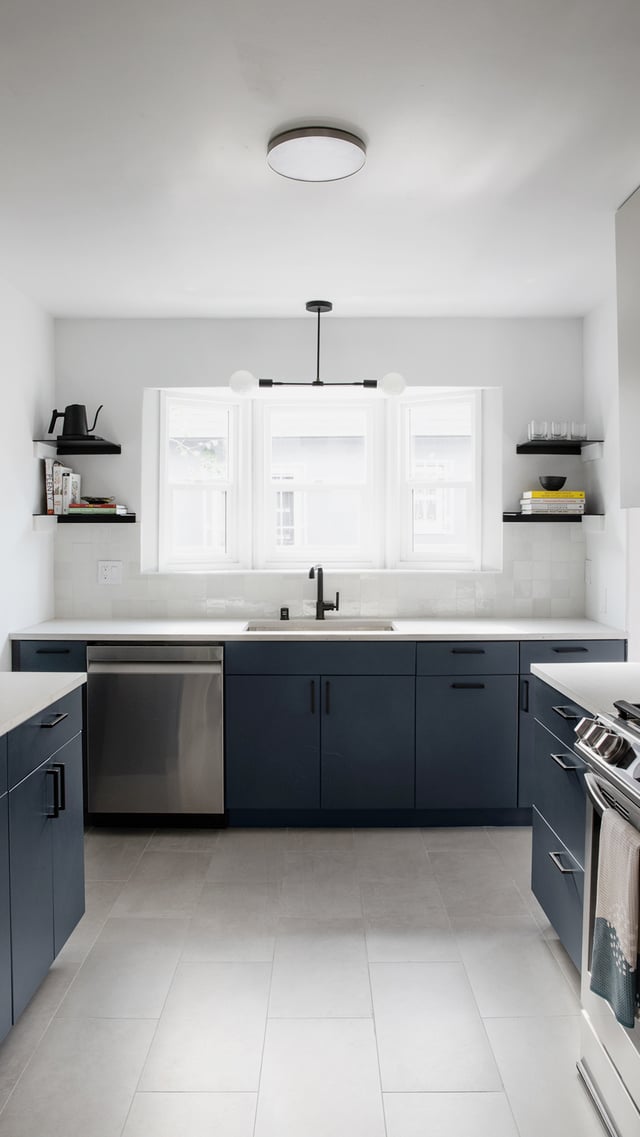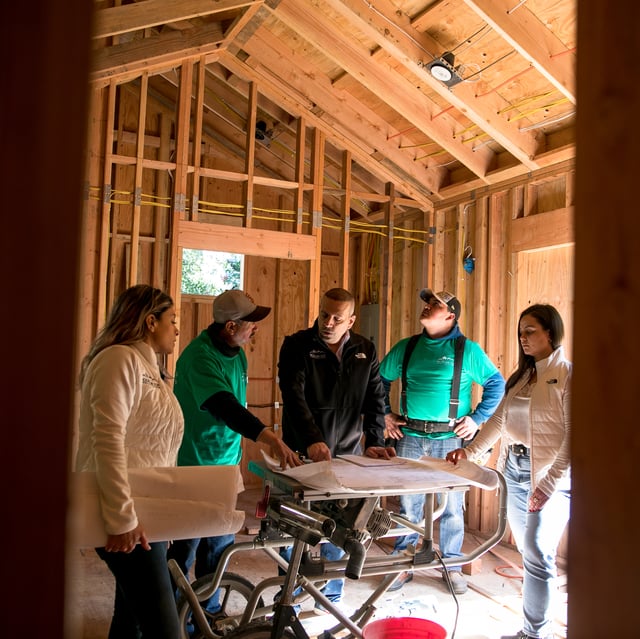Renovating a bathroom is a little like ordering a cheesesteak in Philadelphia—you need to know what you want, who's making it, and how much it's going to cost before you get in too deep. And let's be real: just like you wouldn't walk into a South Philly deli and casually ask for "just a steak sandwich," you don't want to jump into a bathroom remodel without a solid understanding of local pricing.
In Philadelphia, bathroom renovations can range from a relatively modest $10,000 refresh to a full-blown $50,000+ spa-like transformation. And while that number might make you clutch your outdated vanity in terror, understanding the costs upfront is crucial for budgeting (and avoiding financial heartbreak).
So, what makes Philly bathroom renos so variable? Labor costs, permits, material choices, and even the quirks of older row homes can all impact the final price tag. A century-old plumbing system? That's going to cost you. Dreaming of heated floors? Get ready to splurge.
Before you start ripping out tiles, let's break down the real costs, the hidden expenses, and how to avoid turning your bathroom project into a never-ending money pit. Because in this city, the only thing worse than a bad reno is a bad cheesesteak order.
Average cost to renovate a bathroom in Philadelphia
Bathroom renovations in Philly can range anywhere from "Okay, that's doable" to "Guess I'm showering at the gym forever." Your total cost depends on factors like size, materials, and whether you're going for a simple refresh or a full-on spa retreat.
Range of bathroom renovation costs
Here's a rough breakdown of what you can expect to pay, depending on the level of renovation:
- Small or basic renovation: $10,000–$15,000
- Fresh paint, new fixtures, maybe a new vanity if you're feeling fancy.
- Mid-range renovation: $15,000–$30,000
- A full gut job but with standard (not ultra-luxury) materials. Think subway tiles, a new tub, and upgraded plumbing.
- Luxury renovation: $30,000–$50,000+
- The "I want to feel like I'm at a five-star hotel" level. Heated floors, high-end finishes, a rainfall shower, and maybe even a bidet if you're feeling extra.
If you're renovating a historic home, be prepared for unexpected costs. There's nothing like opening up a wall and discovering 100-year-old pipes that look like they belong in a museum.
Factors affecting cost
Size matters. A small powder room will obviously cost less to update than a sprawling master bath with double sinks and a walk-in shower. More square footage = more materials, more labor, and more money.
A partial renovation (swapping out fixtures, repainting, maybe new tiles) is significantly cheaper than a full gut job. If you're tearing everything down to the studs and reworking the layout, costs will climb fast.
Marble countertops? Custom vanities? Fancy light fixtures that make you feel like you're in a design magazine? The more high-end your materials, the more you'll pay. If you want to save, consider mixing high and low—maybe splurge on a statement tile wall, but go budget-friendly on the vanity.
Learn More: Winter Bathroom Renovation Ideas to Keep Your Home Cozy
Labor costs
Labor isn't cheap, and in Philly, you'll pay anywhere from $75–$150 per hour for skilled trades like plumbers and electricians. Permits and inspections can also add costs, especially if you're dealing with an older home that requires upgrades to meet current building codes.

Cost breakdown
So, you're diving into a bathroom renovation in Philadelphia. You've picked out your dream tiles, imagined yourself in that fancy rainfall shower, and maybe even bookmarked some trendy vanities. But before you start knocking down walls, let's talk about the nitty-gritty: costs. Because as much fun as it is to design your perfect space, the real challenge is making sure your budget survives the process.
Labor costs
Labor is where a huge chunk of your renovation budget will go. You're not just paying for someone to install your new toilet—you're paying for their expertise, time, and ability to make sure your pipes don't explode a week after they leave.
Here's who you'll likely need:
- General contractor: Manages the whole project, coordinates different workers, and ensures everything runs smoothly. Expect to pay around $50–$100 per hour or 10–20% of the total project cost.
- Plumber: Handles everything from installing new pipes to ensuring your shower drains correctly. Plumbers in Philly charge $75–$150 per hour.
- Electrician: If you're adding new lighting, outlets, or heated floors, you'll need an electrician. Their rates run around $75–$125 per hour.
- Tile installer: Good tiling is an art form, and you don't want to DIY it unless you enjoy uneven grout lines haunting you forever. A tile pro will run you $5–$15 per square foot for labor.
Material costs
Now, let's talk about the fun stuff: materials. What you choose for flooring, countertops, and fixtures can make or break your budget.
- Flooring: Basic ceramic tiles can start at $2 per square foot, while fancy marble or natural stone costs $10–$30 per square foot.
- Countertops: Laminate is the budget-friendly option at around $30–$50 per square foot, while quartz or granite will run you $75–$150 per square foot.
- Vanities: A basic stock vanity from Home Depot can be $300–$800, while a custom-built one can be $1,500+.
- Fixtures: Faucets, showerheads, and toilets can range from $100 for basic models to $1,000+ if you want the kind of toilet that practically sings to you.
Local suppliers in Philly, like Ferguson and Weinstein Supply, offer a range of high-end and budget-friendly options if you want to check out materials in person.
Learn More: 7 Key Factors That Influence Bathroom Remodel Costs in 2025
Permits and inspection fees
You'll need permits if your renovation involves plumbing, electrical work, or structural changes. And in Philly, permits are no joke.
- A basic bathroom remodel permit can range from $50 to $300, depending on the scope of work.
- Major plumbing or electrical changes may require additional permits, adding another $100–$500 to your costs.
- Inspections are required to ensure your work meets city codes, and failing an inspection could mean redoing parts of the project (and spending more money).
It's best to check with the Philadelphia Department of Licenses & Inspections to see what's required before knocking down walls.
Unexpected costs
Surprise! Your 100-year-old row home has plumbing that looks like it belongs in a museum. Hidden problems are one of the biggest reasons renovations go over budget. Some common unexpected costs include:
- Plumbing issues (old pipes that need replacing)
- Electrical surprises (outdated wiring that isn't up to code)
- Structural damage (water damage, rotting subflooring, etc.)
The best way to avoid financial panic? Set aside at least 10–20% of your total budget for surprises. If you don't end up needing it, great! You can use it for an upgrade, like that heated towel rack you didn't think you could afford.
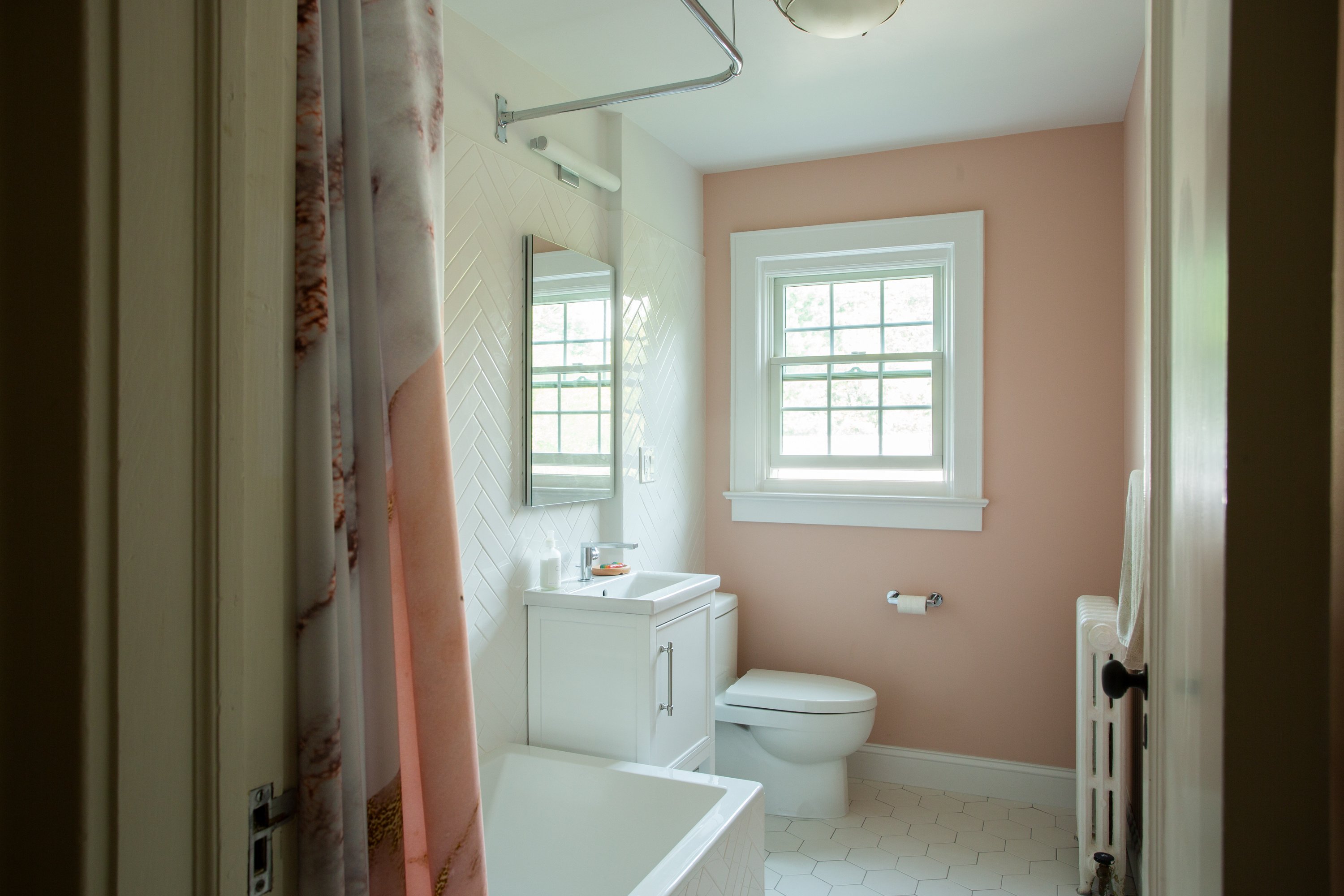
Popular bathroom upgrades in Philadelphia
Philadelphia homes have character—whether you live in a classic row house, a historic brownstone, or a sleek new condo. But character isn't always a good thing when it comes to bathrooms. (Looking at you, outdated pink tile from the '50s.) That's why more and more Philly homeowners are investing in bathroom upgrades that make their spaces both stylish and functional.
So, what's trending in the city? Let's talk about the most popular materials, design styles, and must-have features making their way into Philly bathrooms.
Trending materials and design styles in the region
Philadelphians love a mix of modern convenience and historic charm. Whether you want to keep some vintage elements or go full-on contemporary, these trends are dominating bathroom renovations across the city:
- Timeless subway tile: It's a classic for a reason. White subway tile with dark grout remains a favorite, especially in older row homes where people want to honor the past while still feeling fresh.
- Natural stone and marble accents: If you're going for a high-end look, marble vanities and stone shower walls are huge right now. Carrara marble is particularly popular, though be warned—keeping it looking pristine requires a little extra maintenance.
- Matte black or brass fixtures: Say goodbye to boring chrome. Matte black and warm brass finishes are the go-to choices for faucets, showerheads, and cabinet hardware. They add a bold, modern contrast that works well with both vintage and contemporary designs.
- Floating vanities: These sleek, wall-mounted vanities create a clean, open feel—perfect for making a small Philly bathroom seem slightly bigger. Bonus: they make cleaning the floor much easier.
- Textured tiles: Whether it's a herringbone pattern, geometric designs, or bold Moroccan-inspired prints, statement tiles are everywhere. A pop of texture on the floor or in the shower can instantly elevate your space.
Common upgrades
A bathroom renovation isn't just about making things look pretty—it's also about making your life better. Here are some of the most popular functional upgrades that Philly homeowners are investing in:
- Heated floors: If you've ever stepped onto an ice-cold tile floor in the middle of winter, you know why this upgrade is gaining traction. Radiant heated floors keep your feet warm and help distribute heat evenly throughout the bathroom. Perfect for those frigid Philly mornings when getting out of the shower feels like a punishment.
- Walk-in showers: Bathtubs are great if you actually use them, but many homeowners are ditching their tubs in favor of spacious walk-in showers with frameless glass doors. They make bathrooms feel bigger, look more modern, and are much easier to clean. Plus, if you go all out with a rainfall showerhead and built-in bench, you'll never want to leave.
- Modern lighting: Good lighting can make or break your bathroom, and the days of a single dim overhead bulb are long gone. People are installing LED backlit mirrors, pendant lights, and even smart lighting systems that adjust based on the time of day. (Yes, you can now have a bathroom that gives you "good morning" light in the a.m. and "relaxing spa vibes" in the p.m.)
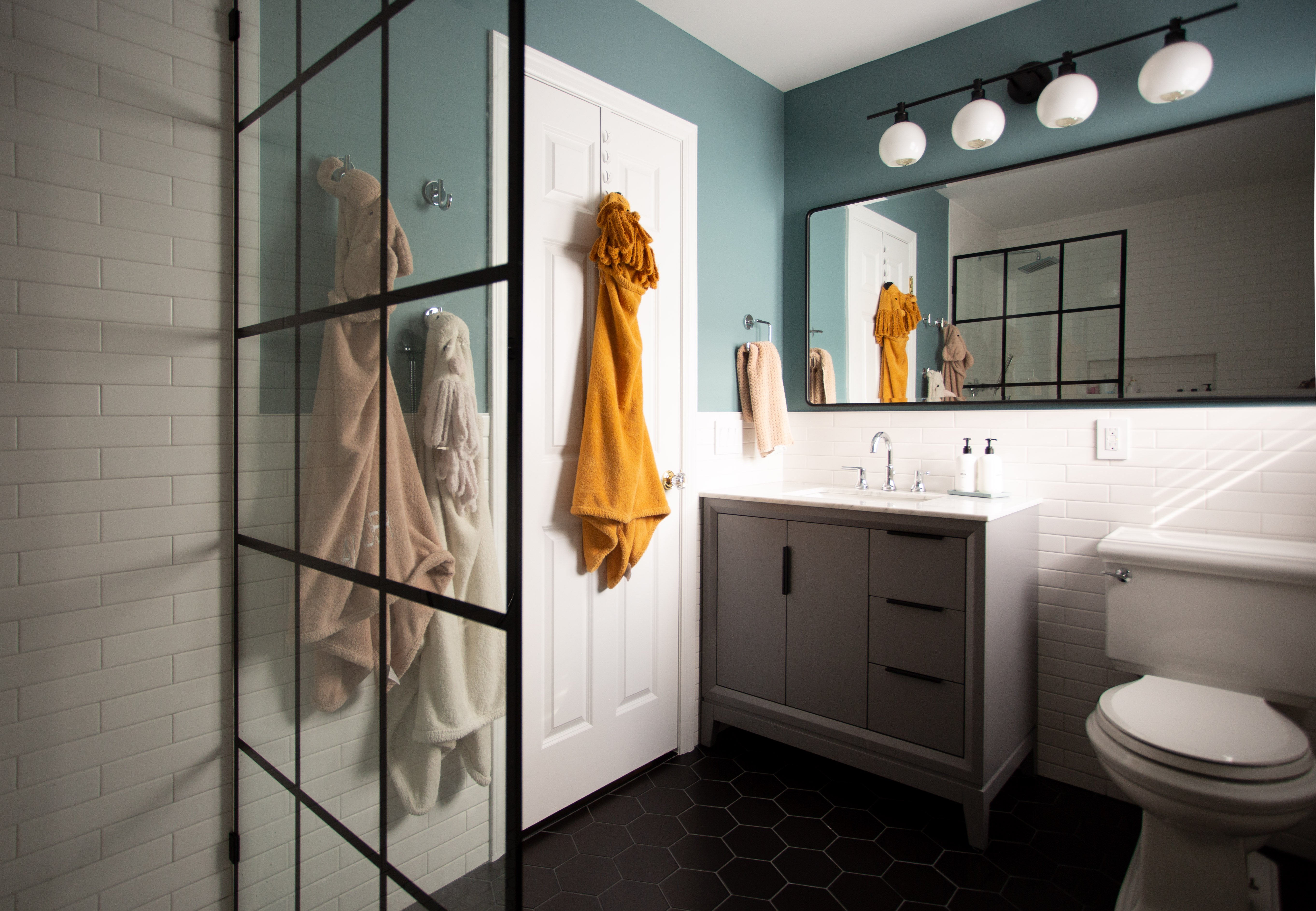
Cost-saving tips for a bathroom renovation
Renovating a bathroom in Philadelphia isn't cheap, but that doesn't mean you have to drain your entire bank account (or sell a kidney) to get the bathroom of your dreams. With a little strategic planning, smart sourcing, and knowing where to cut costs without sacrificing quality, you can get a stunning new space without going wildly over budget. Let's talk about how to make it happen.
Where to splurge vs. where to save
Not every part of your renovation needs to be top-of-the-line. Knowing where to spend and where to cut back can make all the difference.
- Splurge on plumbing and electrical work. If there's one area where you don't want to go cheap, it's anything behind the walls. Bad plumbing or electrical work can turn into a nightmare down the road. Hire professionals and make sure everything is up to code.
- Save on tile. Those dreamy marble shower walls? Gorgeous but pricey. Instead, opt for high-quality ceramic or porcelain tile that mimics the look of marble for a fraction of the cost. Bonus: they're also easier to maintain.
- Splurge on a quality toilet and shower fixtures. These are things you use every day, and cheap versions won't last. Invest in a toilet with good flushing power (trust me, you'll thank yourself later) and solid brass or stainless steel fixtures that won't corrode over time.
- Save on vanities. Custom vanities are nice, but pre-fab options from places like IKEA, Home Depot, or local Philly salvage shops can look just as stylish with the right hardware and countertop.
- Splurge on lighting. Good lighting can transform a space, making it feel bigger, brighter, and more inviting. Go for LED fixtures, backlit mirrors, or dimmable options to set the perfect mood.
- Save on decorative elements. You don't need designer towel bars or a $500 soap dispenser. Simple, well-chosen accessories can elevate your space without the crazy price tag.
Tips for sourcing affordable materials locally
Philadelphia has plenty of great options for scoring budget-friendly materials if you know where to look.
- Check out local salvage yards. Places like ReStore (run by Habitat for Humanity) or Provenance in Northern Liberties have reclaimed vanities, fixtures, and even tile at a fraction of the cost of new ones.
- Shop warehouse sales. Ferguson and Weinstein Supply often have clearance sales on overstocked items, saving you hundreds on high-end fixtures.
- Look for secondhand steals. Facebook Marketplace and Craigslist are goldmines for barely-used sinks, tubs, and vanities from other people's renovations. You'd be surprised what you can find for cheap (or even free!).
- Buy floor models. Many home improvement stores sell their showroom models at a discount—perfect if you're not picky about a minor scuff or two.
How to avoid costly mistakes by proper planning
Nothing blows a budget faster than unexpected mistakes, so planning ahead is key.
- Measure twice, order once. Ordering the wrong size vanity or not factoring in clearance space for a door swing can cost you big time. Double-check your measurements before making any purchases.
- Plan for hidden costs. Always set aside at least 10-20% of your budget for surprise expenses. That old Philly rowhouse you love? It probably has plumbing or electrical surprises lurking behind the walls.
- Get multiple quotes. Don't go with the first contractor you talk to. Get at least three estimates to compare pricing and avoid overpaying.
- Secure permits before starting. Philly requires permits for plumbing and electrical work, and skipping this step can lead to fines or a stop-work order—both of which can derail your budget fast.
- Avoid trend overload. While bold tile patterns and unique fixtures are fun, they can quickly go out of style. Stick to timeless materials for big-ticket items and save trendy choices for easily changeable accents like paint and decor.
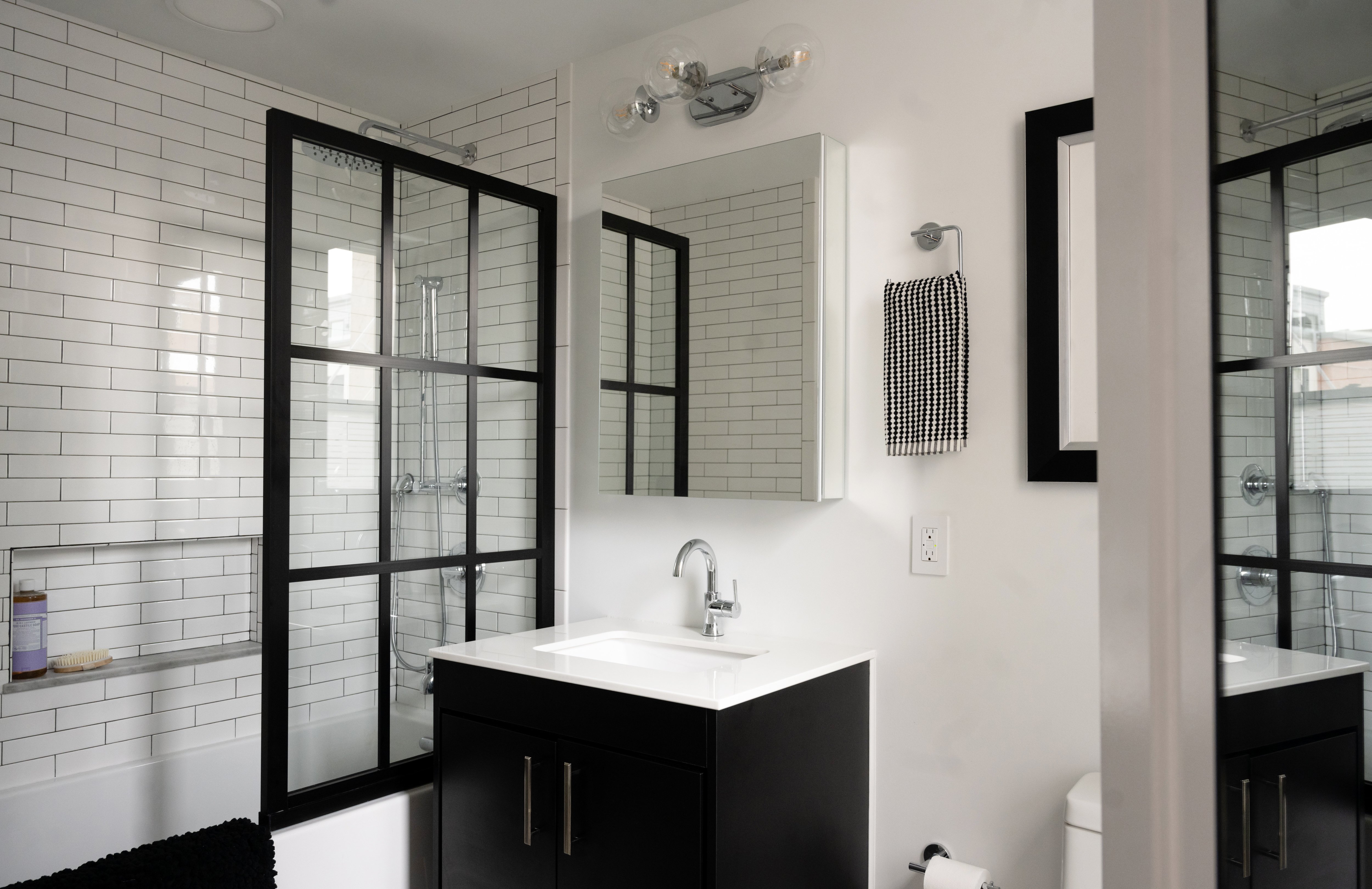
Finding the right contractor in Philadelphia
A bathroom renovation is one of those projects where hiring the right contractor can mean the difference between a smooth, beautiful remodel and a months-long disaster that leaves you showering at your gym indefinitely. Finding the right person (or team) for the job in Philly requires more than just a quick Google search. Here's how to do it right.
Why hiring a local contractor is important
Philly is a city with character, which is a nice way of saying that many homes are old and come with unique quirks. A local contractor will:
- Understand the city's building codes and make sure your renovation meets legal standards. The last thing you want is to finish your project only to find out it doesn't pass inspection.
- Connecting with local suppliers can mean better pricing and faster material deliveries (because waiting weeks for a vanity is not ideal).
- Know how to handle historic homes. If you live in a row house or a pre-war building, chances are your plumbing and electrical systems need extra attention.
Where to find reputable contractors
Finding a contractor who actually shows up and does quality work is the real challenge. Here's where to start:
- Online directories: Websites like Angi, Houzz, and Thumbtack have ratings and reviews from other homeowners, making it easier to weed out the bad ones.
- Referrals: Ask friends, neighbors, or even your local hardware store who they recommend. If someone recently had their bathroom renovated and loves the result, that's a solid lead.
- Block Renovation: A one-stop shop that pairs homeowners with vetted contractors and handles everything from design to installation. It's a great option if you don't want to micromanage every step. Get a free quote here.
What to look for in a contractor
Before signing any contracts, make sure your contractor checks all the right boxes:
- Licensing and insurance: Philly requires home improvement contractors to be licensed. Make sure yours is legit and carries insurance—otherwise, you could be on the hook if something goes wrong.
- Reviews and portfolio: If they don't have photos of past work, that's a red flag.
- Questions to ask:
- Have you worked on homes similar to mine?
- What's your estimated timeline?
- How do you handle unexpected costs?
Average contractor rates in Philadelphia
Philly contractor rates can vary, but here's a rough breakdown:
- General contractors: $50–$100 per hour or 10–20% of the total project cost.
- Plumbers & electricians: $75–$150 per hour.
- Full bathroom remodel: $15,000–$50,000+, depending on scope and materials.
A standard contract should include labor, materials, permits, and cleanup—but always read the fine print. You don't want to pay extra just to remove the construction debris.
Learn More: How to Negotiate with a Contractor
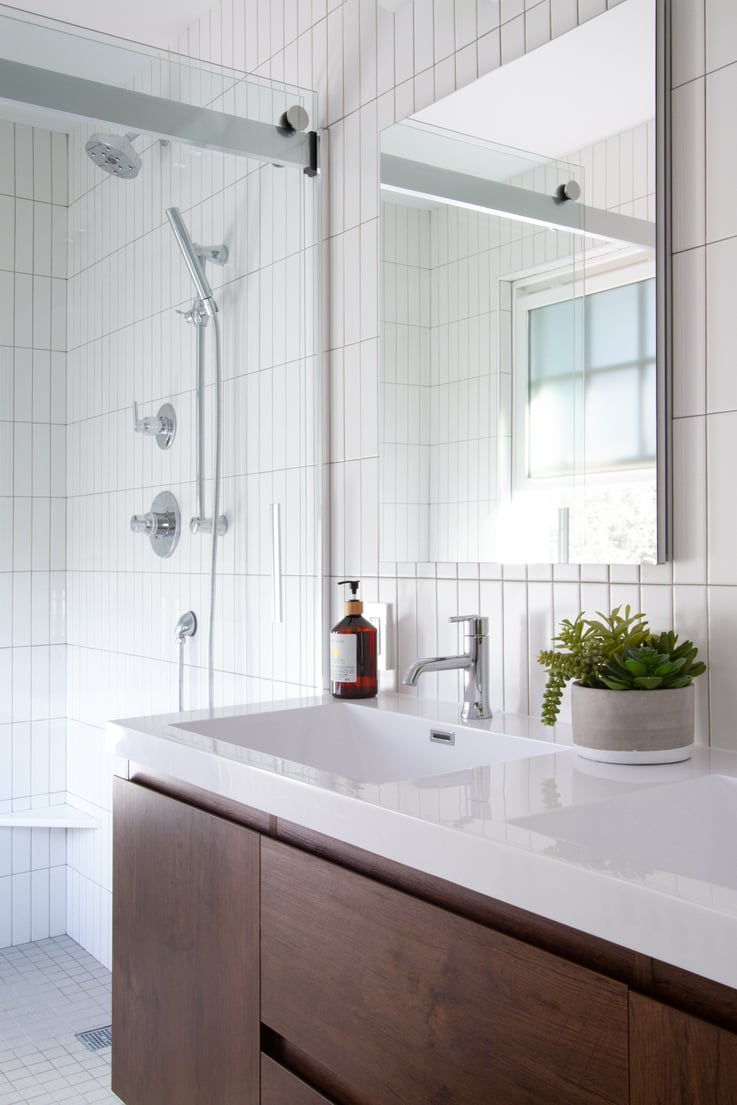
How long does a bathroom renovation take in Philadelphia?
Now for the second-biggest question after cost: how long will this take? The answer depends on the scope of your project.
- Minor updates (new fixtures, paint, flooring): 1–3 weeks
- Mid-range remodel (gut job but keeping the layout): 4–6 weeks
- Major renovation (changing layout, new plumbing, high-end finishes): 8+ weeks
Local factors that can affect project duration:
- Permitting process: Philly's permit approval process can add extra time if you're doing major work.
- Old home surprises: If your contractor opens a wall and finds ancient pipes that need replacing, expect delays.
- Material availability: Custom orders or backlogged suppliers can slow things down—another reason why working with local sources can help.
Conclusion
Bathroom renovations in Philadelphia can range from budget-friendly refreshes to high-end transformations, with costs driven by labor, materials, and unexpected surprises (hello, ancient plumbing). Smart budgeting means knowing where to splurge (plumbing, fixtures) and where to save (tiles, vanities). Sourcing materials locally and planning ahead can prevent costly delays. Most importantly, hiring a reputable, licensed contractor ensures the job is done right the first time. Thorough planning, realistic budgeting, and flexibility for surprises will keep your renovation on track—and maybe even leave you with enough cash for a celebratory cheesesteak when it's all done.
